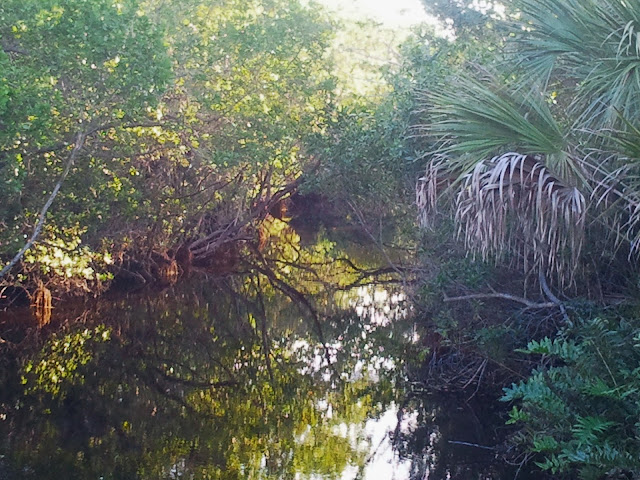Guilty: The Grand Floridian
 |
| Florida lagoons, ponds, and lakes should be surrounded by native vegetation. |
 |
| Alligator eating a bowfin fish behind our former home. |
The hoteliers who decided it would be a good idea to create a "beach" on a human-made lagoon next to the Grand Floridian Resort in Orlando are guilty of creating what lawyers call an "attractive nuisance." In this case, that nuisance was deadly to a toddler who wandered into the shallow water of the lagoon.
I'm willing to bet that some clients of this resort who were enticed by the "beach" also had seen and fed alligators there. They have seen alligators being fed on TV, and here this nice ultra-clean beach had been created so they could easily do the same thing, without even getting their feet muddy.
 |
| Alligator approaching a turtle on a log over the pond in our former back yard. |
Florida lagoons should be, and generally are, mucky, with muddy edges, and should be surrounded by native vegetation. A grassy lawn leading up to a lagoon's edge is almost as dangerous as a beach, because alligators love to bask in the sun on a lawn. Doing anything to bring people and alligators closer together is a very bad idea. Viewing alligators should be done at a distance; for a close-up look, use binoculars or a zoom lens.
All of this is nothing new to Floridians. But people who live far from Florida, in places like Ohio or Nebraska, do not necessarily know about the danger of swimming in fresh water bodies in Florida. I once explained to someone in Ohio who was planning a trip to Florida that one should never swim in lakes or lagoons in this state because of our native alligators. She said she didn't know that.
But those hoteliers at the Grand Floridian do know that. Creating that beach just to help promote the hotel was unconscionable. Posting a "no swimming" sign was nowhere near enough of a warning. There should have been a sign warning of the presence of alligators, and another sign explaining that it is against the law to feed alligators ($500 fine, possible incarceration). But that wouldn't be good marketing, would it?
People, do not ever feed alligators. If you do, you could be killing toddlers.
And people, do not move to Florida and expect the alligators to leave. They were here first.
And people, if you know of other Florida hotels who have created beaches on lagoons, tell them to put the muck and native vegetation back where it belongs around the water's edge.

Well said, Barbara!
ReplyDeleteVery well written, Barbara. You're good on policy, but we knew that of course!
ReplyDeleteThanks, Caroline!
ReplyDelete